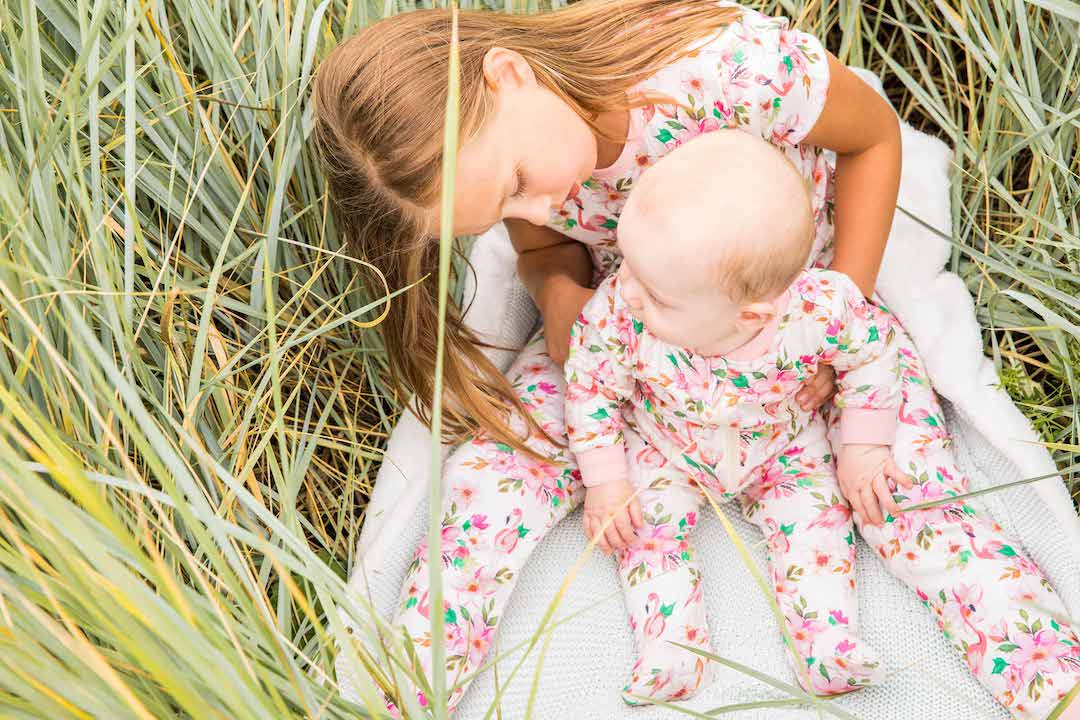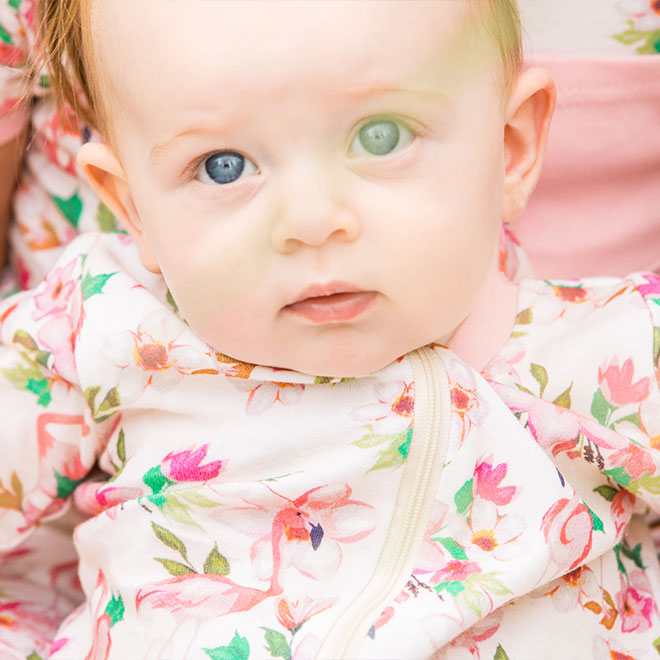Babies
All about babies’ sleep and bedtime
Google Analytics LS

- The different stages of sleep for babies
- At what time should you put your baby down to sleep?
- Is it important to calculate how much time your baby sleeps?
- How to put baby to bed for the night?
- Baby’s sleep from 0 to 3 months
- Baby’s sleep from 4 to 6 months
- Baby’s sleep from 7 to 12 months
- Why does your baby cry before sleep?
- How can you help your baby sleep through the night?
- Why does my baby wake often during the night?
- How to change a baby’s bedtime?
- Can a baby sleep too much?
- A baby who is a light sleeper: what to do?
- Should you let a baby cry?
- Our tips and tricks
- In conclusion
It can be a real challenge to know if your baby is sleeping well enough or to understand why your baby’s sleep is interrupted during the night.
To help you, Deux par Deux, the baby’s clothing store, tells you all there is to know about baby’s sleep and bedtime.
The different stages of sleep for babies
Up until two months of age, your baby only has two stages of sleep: calm and agitated. During agitated sleep, the newborn will be very expressive and might even cry while remaining asleep. These emotions are normal and do not require that you wake your baby.
Around 2 months of age, a baby’s sleep will gradually begin changing. As he or she grows sleep patterns will slowly adapt to match a regular adults’ sleeping pattern. Our sleep patterns include three stages: light sleep, slow and deep sleep and agitated sleep, which is also called REM sleep (for Rapid Eye Movement).
The first stage is the period in which sleep is still fragile or light. Then, once your baby reaches deep sleep, it becomes more difficult to wake them. Agitated sleep is always the stage in which your baby is dreaming and can have different dream related reactions.
Baby bedtime: at what time should you put your baby down to sleep?
During the first 6 months, there is no precise time that is better for your baby to go to sleep given that your baby is not yet capable of sleeping through the night. In fact, feeding times will help you give a certain rhythm to the sleep cycle, which occupies most of your newborn’s time.
Around 6 months of age, your baby should start being able to sleep through the night. At this point, a sleep time of 7 pm can allow for around ten to twelve hours of sleep time during the night, and a normal wake time as well.
If possible, it is really important for your baby to be in bed before 8:30 pm, in order to avoid problems falling asleep.
Is it important to calculate how much time your baby sleeps?
It is not necessary to count how many hours your baby sleeps. Just make sure that your little one gets all the sleep they need.
If your baby is alert and in a good mood upon waking, that means your child is getting enough sleep. You can think of calculating your baby’s sleep time if you notice that your little one seems tired even upon waking or seems to have trouble sleeping or has interrupted sleep patterns.
How to put baby to bed for the night?
The only position that is recommended to put a baby to sleep safely, is on the back. This position is important in order to avoid sudden infant death syndrome.
As your baby gets older, they will begin turning over on their own, on their bellies, during the night. This transition happens around 6 months of age. At this time, you won’t have to force your baby to sleep on their back, but recommendations are that you continue to do so until 1 year of age.
Baby’s sleep from 0 to 3 months
At this age, your baby will generally sleep in 2 to 4 hour increments. Some might wake only to drink, while others spend more time awake.
No need to wake your baby for a feeding, unless they have health issues and a doctor has recommended it.

How many hours should a baby from 0 to 3 months sleep?
A newborn sleeps around 14 to 17 hours a day. You do not have to calculate the amount of hours your baby sleeps, you just have to make sure that they get to sleep whenever they want to.
Baby’s sleep from 4 to 6 months
Given that your newborn has grown a lot, your baby will now have greater energy reserves. This means that more time will go by between feedings. Moreover, habits are beginning to form in your baby’s sleep and you should start noticing more regular sleeping hours.
In general, babies that age will nap around three times a day: once in the morning, once in the afternoon and a last one at the end of day.
How many hours should a baby from 4 to 6 months sleep?
At this age, your little one should sleep around 12 to 15 hours over a 24 hour period. Moreover, your baby should start sleeping for longer stretches during the night. A baby that age can often sleep for 5 or 6 consecutive hours.
Baby’s sleep from 7 to 12 months
Between 7 and 12 months, your baby should slowly develop the capacity to fall back asleep on their own. Before reaching this milestone, separation anxiety takes up a lot of space in the child’s wellbeing. Your baby will need to be reassured regularly to fall asleep or fall back asleep. Eventually, this anxiety will diminish and your little one will learn how to fall asleep alone.
How many hours should a baby from 7 to 12 months sleep?
Total sleep time should continue to decrease. Between 7 and 11 months, your baby will sleep around 12 to 15 hours a day. Around 12 months, this should go down to 11 to 14 hours a day. This will continue to diminish as your child ages, until their sleep pattern resembles your own.
The right night clothing can also have an impact over your little one’s sleep; our article on how to dress baby for sleep can help you see more clearly.

Why does your baby cry before sleep?
For newborns, the only way to communicate is through crying. There are several reasons for which your baby can cry before falling asleep. Among the most frequent, there are:
- Solitude
- The need to see mommy
- Anxiety induced by silence
- The dark
- Hunger
- Discomforts
- And so many more possibilities!
Without a context, it is close to impossible to determine why a baby cries before sleep. In general, trying to feed or reassure your little one are the best solutions to help your baby fall asleep quickly.
How can you help your baby sleep through the night?
There are several ways to help your baby sleep through the night. For example, you can start by establishing a bedtime routine. Singing lullabies, for example, for 10 to 15 minutes can be an excellent habit for bedtime with your baby.
Moreover, recommendations are to stop games and stimulation for a little while before bedtime. Being calm will help your child relax and fall asleep more easily. In short, it is important to give your child a chance to settle down in order to help them fall asleep easily.
However, it is always important to remember that young babies are simply not capable of sleeping through the night. This means that you can expect to have to help them fall back asleep if necessary.
Why does my baby wake often during the night?
Hunger is the main reason why babies wake in the night. In fact, since their small stomach is limited, they have to feed often in order to feel full. Some babies are also light sleepers and any change in their environment will cause them to wake up.
Moreover, newborns have a different sleep cycle that goes through several stages of light sleep. This means that it is much easier for a baby to wake up during the night.
It is perfectly natural for your baby to wake up often during the night. All you have to do is try to feed or reassure your baby to soothe them back into sleep.
How to change a baby’s bedtime?
If you wish to change your baby’s bedtime, all you have to do is transition the routine closer to the time you want them in bed. You might want to play or stimulate your little one longer in order to keep them awake.
It is also important to transition the bottles too. Give them half a bottle to ease their hunger and keep the full bottle for the preferred bedtime.
Can a baby sleep too much?
As previously mentioned, babies sleep a lot. This means there is no reason to worry if your baby sleeps for most of the day: it’s normal. For a baby under 3 years of age, 2 hrs over normal might warrant a visit to the doctor’s office.
However, this gap must be repetitive and unexplainable. If your baby sleeps more because of a busy day, this is very normal. In short, unless you are concerned that your baby is sleeping way too much, there is no reason to worry.
A baby who is a light sleeper: what to do?
Listening to your little one is important. If your baby wakes often, it is possible that it is due to hunger or something in the environment that is bothersome.
In general, all babies go through stages of light sleep during the night, which means that they are easier to wake during several periods throughout the night.
It is possible that light or sound might be disturbing your baby’s sleep.
If your newborn seems to be a light sleeper, make sure you minimize light and sound so that you keep from disturbing their sleep.

Should you let a baby cry?
You should never let a baby cry before your newborn reaches 6 months of age. Newborns need all the attention and comfort you can give them. You can take a few minutes to calm down, but you should always soothe your young baby.
Eventually, when your baby reaches 1 year of age, you can begin teaching autonomy. If you believe that all of your little one’s needs are met (they are fed, comfortable, etc.), then you can let a child that age cry and fall asleep alone.
After a few nights, your baby should learn how to fall asleep alone. If it doesn’t get better after a week, you should stop and consider consulting a psychiatrist. A professional will be able to help you understand the reasons behind your baby’s troubled sleep.
Our tips and tricks to create an environment for your baby that is sleep-conducive
It is important that the environment in which your baby is sleeping be adapted to their needs. Create a sleep-conducive atmosphere in the bedroom with soothing decorations and a contained sleeping environment.
Then, make sure that interior temperature in the room is comfortable. A temperature between 18 °C and 20 °C is recommended in a baby’s bedroom.
You can also clothe your little one with a very comfortable baby’s pyjama to ensure a peaceful night. Adjust the sleep clothing to the season.
Finally, enough humidity in the air –from 40 % to 50 %- is favorable to your baby’s health and sleep. Depending on the room, you might want a humidifier or dehumidifier to make the air more comfortable.
In conclusion
There are several factors to take into consideration that can help your baby sleep properly. One of the most important is to know your newborn’s needs. To help, we have made a summary table that explains children’s sleeping needs according to their age.
How many hours should your baby sleep?
| Baby’s age | Hours of sleep a day |
|---|---|
| 0 to 3 months | 14 – 17 hours |
| 4 to 12 months | 12 – 15 hours |
| 1 to 2 years | 11 – 14 hours |
| 3 to 5 years | 10 – 13 hours |
| 6 to 12 years | 9 – 12 hours |
| 13 years and over | 8 – 10 hours |
Our pyjamas for baby girls and our pyjamas for baby boys are essential for your baby’s comfort while sleeping. You can trust in Deux par Deux, our online clothing store for babies. Discover our outstanding offers today!



